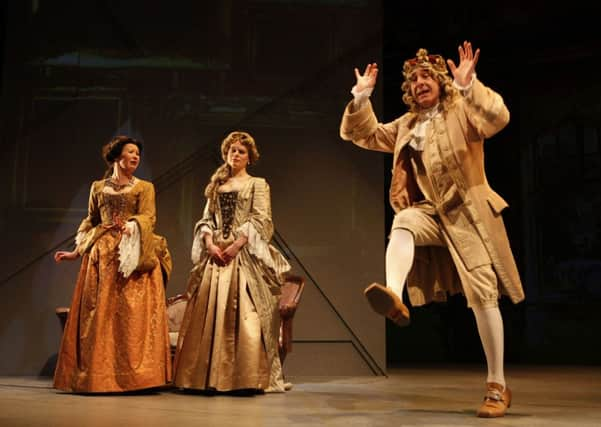Joyce McMillan: Beware of stereotyping Scots tongue


Amid all the debate surrounding the play, though, one aspect of it that should not be neglected is its odd and ambiguous relationship with the Scots tongue.
That the play is mainly written in various forms of Scots is no surprise; it’s set at a time when almost everyone in Lowland Scotland spoke some form of Scots, and it aims to combine that historical awareness with today’s living Scots speech. And it’s also clear that Tim Barrow is determined, in some parts of the play, to suggest the range of Scots speech at the time; the sequences set in the old Scottish Parliament are sober and powerful, and there are some touching moments of lyricism as the hero, the young poet Allan Ramsay, brings his enthusiasm for classical myth and legend to bear on his love affair with a Royal Mile prostitute called Grace.
Advertisement
Hide AdElsewhere, though – and for most of the play’s length – Barrow and the Lyceum company fall headlong into the old trap of suggesting that Scots is good for nothing but “flyting and fighting” – that is, that it is in its nature a crude street language with special qualities of “earthiness” and “realism”, mainly associated with obscene abuse, drunken aggressiveness, toxic hyper-masculinity, and a notable ugliness of voice.
Now, any student of language will tell you that these qualities are not inherent in any language. They are, in fact, a stereotypical list of the qualities routinely associated with languages which have lost political power, and have therefore gradually lost their perceived ability to deal with the “higher things” of life.
Even today, most Scots still believe that the Scots tongue is simply an incorrect form of English, to be left behind in the quest for refinement and social advancement; the impressive history of the language, and the heights of poetry and philosophy to which it once soared, are largely unknown, although the discovery of them remains immensely empowering to those Scots lucky enough to make the journey.
What is sad about this, though, is that there was a moment – back in the 1980s – when a new generation of theatre-makers seemed to be on the verge of a major reinvention of Scots speech for new times. They were not the first; one of the funniest and most brilliant plays ever written about the Scots tongue, for example, is Robert McLellan’s 1948 play The Flouers O’ Edinburgh, recently republished by Luath Press.
In the 1980s, though – as director Charlies Nowosielski explored the rich lyrical and erotic power of the Border Ballads, and Liz Lochhead, in Mary Queen Of Scots Got Her Head Chopped Off, reinvented a sparkling, sensuous and poetic Scots with a seductive female voice – it seemed as though Scots speech in the theatre was finally reacquiring a range and richness it perhaps had not seen for several centuries.
Well, times move on; and in the ever-more globalised culture of the 1990s and 2000s, the dominance of standard English and American voices only increased, in Scottish theatre as elsewhere. Perhaps it’s time, though, for another effort to break the bonds of the “flyting and fighting” cliché when it comes to the Scottish voice. Actors who tend to equate Scots speech with shouting and aggression would find the shift to a wider range liberating; writers would find it full of strange and exciting possibilities, both in historical drama and elsewhere.
Advertisement
Hide AdAnd that brings us back to the point where Union begins: with good intentions of showing an entire nation on the cusp of change, but with a fatal tendency to lapse – under pressure – into the stereotyped image of a people forever down the pub, shouting the odds, throwing punches, and swearing a blue streak, far into the Edinburgh night.